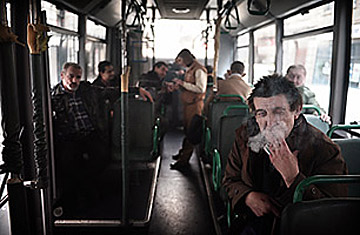
Smoking a cigarette on French public transport.
When France outlawed smoking in public places three years ago, residents took the news remarkably — almost shockingly — well. Almost overnight, cigarettes vanished from offices, restaurants, cafés and train stations as the French dutifully took their glowing butts outside — the only place where smoking was still permitted. But this being France, a backlash was almost certainly inevitable. According to a report released on Dec. 17 by an anti-smoking group, the initial obeisance of French smokers has now given way to people increasingly flaunting the law by lighting up indoors.
The Non-Smokers' Rights (NSR) association says it has collected data and evidence showing that the ban on smoking in the workplace is currently being violated far more than it was when the law came into effect in 2007. Studies show that complaints by people of exposure to second-hand smoke at work, which dropped from nearly 43% in 2006 to just 9% the following year, has now gone back up to 21%, according to NSR. The reason? Widespread government enforcement of the law never materialized as expected, leaving employers and workers less worried about being fined nearly $200 per infraction. Some employees now light up at their desks or by the coffee machine instead of joining their shivering colleagues outside, and many bosses turn a blind eye to it.
"The clear lack of inspection or punishment has inspired a small minority of smokers to ignore the ban — a lead that a growing number of their co-workers are deciding to follow," says Rémi Parola, a NSR official. "The law was effective in getting people to accept non-smoking as the legal and social norm, and that's now being slowly eroded."
And it's not just happening at work. NSR says non-enforcement is giving defiant smokers the courage to light up in other public areas. Some smokers now routinely puff away in bars or cafés and self-policing owners and managers are often hesitant to tell them to stop out of fear they'll anger paying clients. Worse still, NSR says, are the enclosed terraces proliferating outside cafes and restaurants across France. The temporary glass or plastic structures were initially set up to keep customers warm so they can enjoy an "outside" café experience in chilly weather. But when smokers were forced outside, these terraces became de facto smoking zones that other patrons now have to cross to get indoors. NSR contends that the smoke also drifts inside — it says it has conducted tests showing that the air in establishments with covered smoking terraces is three times as toxic as in restaurants and cafés without them.
Anecdotal evidence also abounds that French smokers are pushing back in ways that they previously didn't dare. On some French train lines — all of which are officially non-smoking — smokers frequently take over certain cars, thus far escaping punishment. Butts are also turning up in greater numbers in Paris' Metro. "I'm not bothering anyone, and if I am, they can go to another part of the platform," says a man who identified himself only as Adel as he smoked in the Etienne Marcel station recently. "If I see a Metro official, cop or someone who looks like they'll be a real pain, I won't light up. But otherwise, why shouldn't I smoke in the Metro when I want to and can get away with it? Especially because there are far worse smells in here than smoke!"
Down the street from the station, the manager of a plastic-enclosed caféterrace similarly rationalized bending the rules. "This is outside, and it's the only place where smokers are allowed, so it's all legal," says the man, who, perhaps aware that his enclosed smoking terrace is not actually kosher, requested that neither his name nor the name of his establishment be identified. "We have to live together, and this is one compromise to make that happen. Do you see anyone complaining?"
Not yet, perhaps. But one look at the countless smokers bundled up outside offices in Paris suggests that the transgressors are still a relatively rare exception to the rule. If smokers become bolder about lighting up indoors, however, non-smokers may begin demanding greater action from authorities. Even Parola acknowledges that second-hand smoke levels have vastly improved since the ban went into effect, saying his group's current campaign is only aimed at improving enforcement enough to prevent a gradual return to 2006 habits.
To ensure that the pro-smoking movement doesn't gain any more ground, authorities may have to do just that. Even though there are costs associated with enforcement, the government will probably still come out ahead —officials estimate that the state spends about $15 billion a year treating smoking-related illnesses. Stamping out a few butts could amount to very little in comparison.
